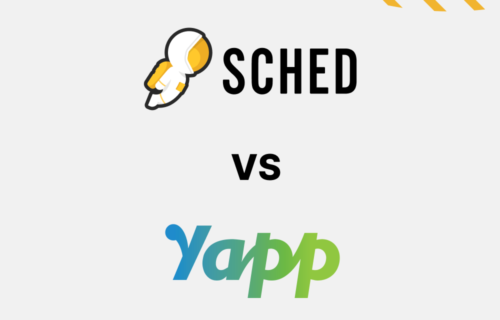Summary
- Sched vs. Webex Face-off: Explore the battle between Sched’s user-friendliness and transparent pricing and Webex’s advanced features but complex pricing.
- Ease of Use: Sched’s intuitive interface caters to both novices and seasoned event organizers, unlike Webex’s robust but less intuitive platform.
- Transparent Pricing: With Sched, what you see is what you get in terms of costs, a refreshing change from Webex’s potential hidden fees.
- Plan More for Less: Sched’s plans let you plan unlimited events throughout the year.
- Host Small Events Free: Use Sched free for events with less than 50 attendees.
- Performance Efficiency: Sched ensures smooth operation without taxing your device, a notable contrast to Webex’s resource-intensive application.
- Real Experiences: From Digital Promise Global’s educational initiatives with Sched to Team DSM’s expansive virtual event via Webex, discover how each platform performs in real-world scenarios.
Too many options can leave consumers feeling confused. And in the event software market, you’re spoiled with loads of cool competitors to choose from.
To make your buying journey clear, we’re comparing competing products in simple terms. This time, we’ve pitted Sched vs. Webex.
In this article, you’ll learn the pros, cons, pricing, and real testimonials that will help you decide which solution suits you best.
So read on – the sooner you’ve identified your chosen solution, the sooner you can start delivering elevated events for your attendees!
Sched vs. Webex: Direct feature comparison
Table of contents

Sched and Webex come at event management from different angles. Webex is owned by Cisco. They are one of the biggest digital communications technology companies in the world. Meanwhile, Sched is a smaller, but more dedicated company in this space.
Sched’s main advantage is its simplicity. Both in terms of its usability and pricing. The following table highlights each company’s core strengths:
| Webex | Sched |
|
|
|
|
|
|
|
|
|
|
|
|
Remember, Sched is constantly evolving. For example, check out the latest feature updates that customers are already enjoying!
Sched vs. Webex: Pricing
Price is a key consideration when buying any product or service. Here’s how the two companies’ pricing structures break down:
Sched’s Pricing
Sched’s pricing plans give you the freedom to plan more, for less. Every plan includes unlimited events and free small events for up to 50 attendees.
Sched’s pricing starts from:
- Launch: $599
- Boost: $1,499
- Ultra: $4,999
Inviting more attendees? Only pay for what you need; Sched lets you tailor your plan with attendee bundles.
Sched also offers generous discounts for specific organizations:
You may also be eligible for a discount if you already use event management software. Save up to 20% with Sched’s switching discount.
Webex’s Pricing

Providing solutions for the hosting of webinars and events is just part of Webex’s offering. The Pricing page provides further details. As with Sched, the number of attendees per event is the major determining factor. Like with Sched, there is a bar at the top of the Pricing page that you can use to change this parameter.
Webex offers two core packages: Webex Webinars and Webex Events.
For Webex Webinars, for an attendee capacity of up to 1,000 attendees, the company has a special offer of $68.75 per license per month. This increases to $4,950 per license per month for between 5,001 and 10,000 attendees. There are bespoke solutions available for larger events.
There is no pricing for Webex Events. The company asks customers to contact their sales team for a quote.
- P.S. Don’t get caught out. Be aware of the hidden costs of event management apps!
Webex Webinars and Webex Events are different. Webex Webinars are for single-session, virtual-only webinars. Meanwhile, the latter is for multi-session, virtual, in-person, or hybrid events.
Webex offers a translation add-on. It translates in real-time and covers over 100 languages. Closed captioning and live audio simultaneous interpreting are the key services here.
Sched vs. Webex: User reviews and case studies
User reviews and case studies provide individualized perspectives on product performance. They can be very useful in helping customers decide whether a product is right for them.
Here are some key reviews we have discovered:
Sched’s reviews
In March 2020, everything was up-ended by the pandemic. Many organizations needed to switch quickly from in-person events to virtual ones. This was acutely felt in education where teachers had to learn remote teaching techniques as classrooms were closed.
Digital Promise Global hosted an event to teach online learning techniques to teachers. The event’s focus was on training educators who work with under-served schools. Key topics were immersive technology and innovative curricula. The aim was to help them deliver online lessons for students who were stuck at home.
Many teachers may have been unfamiliar with online resources. This meant an intuitive and centralized event management system was key. The ability to personalize the experience for attendees was also important.
“Our attendees liked how easily organized it was…
“Sched falls in as that command-and-control center. Having that really clean interface, having that ability to manage what that looks like, I think was really helpful.
“More stuff in less places, especially in a virtual environment, is my mantra and that’s what gets people together. The fewer clicks that I can do, the more direct links I can give you, the easier it is for you to find information.”
Dan Foreman – Associate Director, Digital Promise
Webex reviews
During the pandemic, professional cycling outfit Team DSM employed Webex to help with their annual launch event. Conveying the glitz and glamor of an in-person event online was a challenge. Facilitating the personal interactions that are key at such launches was also tough.
Through its Webinars package, Webex provided the platform for the launch. They also provided the devices that kept the team, media, and fans connected. TSM realized this enabled them to have a bigger reach than usual.
- BONUS – If you’re hungry to compare more products, here’s our guide to the best virtual events platforms for 2024!
“Events like our team launch, where we present the team for next year, were always in person before. We always invited the press, partners, and other stakeholders. We usually had well over 150 people on-site in the past. But by going virtual with Webex, we had almost 2,000 subscriptions.”
Tyscha Coolen-Waaijer – Project Manager, Team DSM
The global reach of Webex was deemed one of the main advantages.
“After the event, we managed to host some really good interviews We utilized the [virtual] personal rooms, not only on the day of the team launch, but throughout the entire season.
“Our team lives all over the world, so that means we have media attention from all over the world. Real-time translation from Webex makes it easy. In fact, it’s the best, most effective communication that I have ever seen in my five years here, so that’s something we are really happy with.”
Emily Brammeier – Head of Communication, Team DSM
The takeaways
If you are managing an event and need some assistance, then both Webex and Sched are great solutions for you. Both offer streamlined software that can take stress out of your event planning.
Which company is best for you will depend on your specific needs and we hope this article has helped. If you work in the non-profit sector or education, Sched could be a good option for you. This is because Sched offers discounts and has significant experience in this space.
But that’s enough reading for one day. It’s time to start Sched for free and try it out for yourself!






![Sched Alternatives For Event Planning &Amp; Management Software [2025] 9 Sched Alternatives](https://wpc.sched.com/wp-content/uploads/2025/03/Sched-alternatives-500x320.webp)

